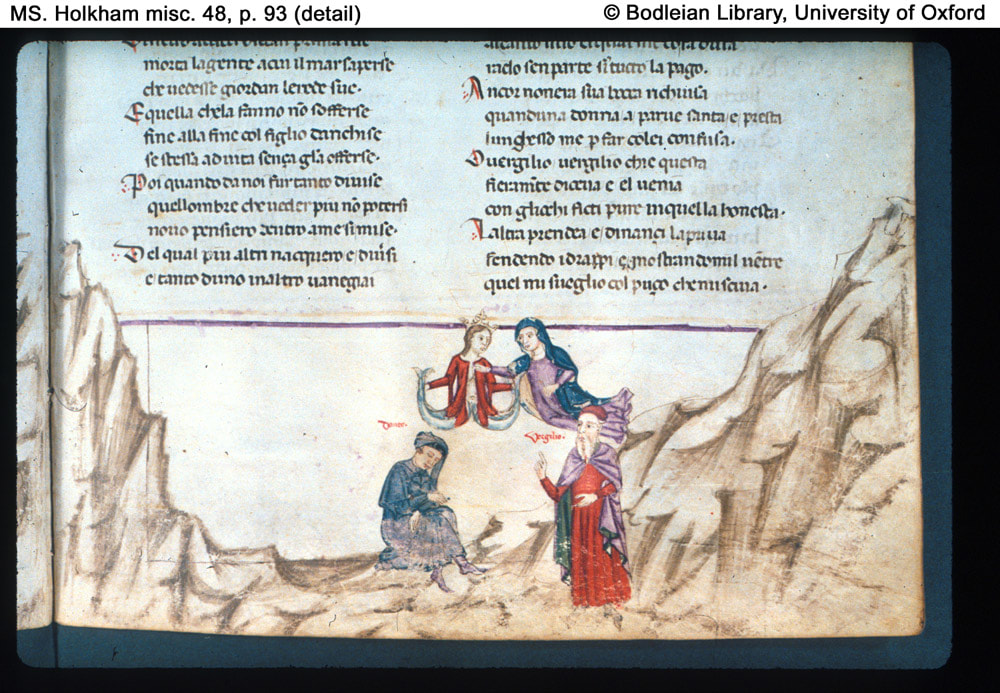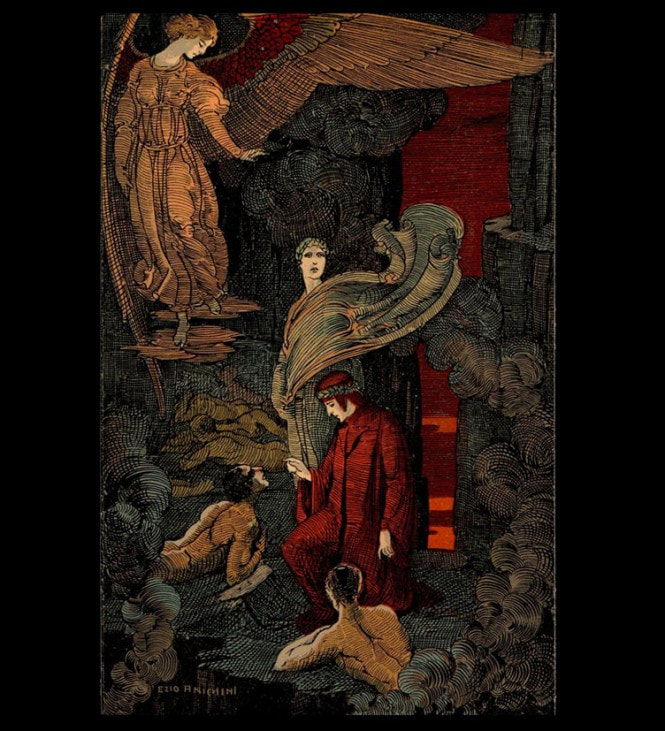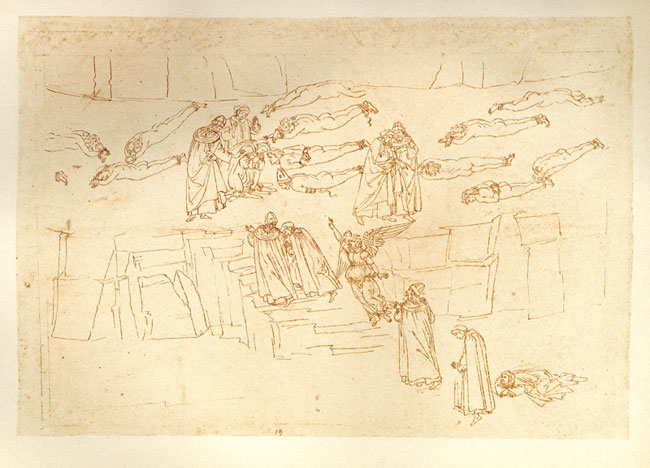There were no dreams in the Inferno and there will be no dreams in the Paradiso. It is only here, on Mt. Purgatory, that time ticks on and pilgrims are forced to rest, sleep and dream. The first dream, if you remember, was in Canto 9 where Dante dreamt he was carried aloft by a great eagle. The action was fierce and the poetry beautiful, drawing parallels to St. Paul’s being taken up to heaven in a “raptus” or vision. Dante the Pilgrim, however, was taken to the gates of Purgatory proper in the first dream. The last dream will be in Canto 27 as he moves toward the gates of Paradise. Here, the transition is to the top levels of Mt. Purgatory, but the transition is interior, solidifying the lessons on Love.
We come now to one of the most famous dreams in all of literature. We are prepared for it with a lovely lead-in at the end of the previous Canto XVIII. He is mulling over all he has learned, having been given free rein to question Virgil to his heart’s content about freedom, love and reality. Since one is not allowed to travel at night on Mt. Purgatory, he is forced to sit and meditate, in a sense. But that soon devolves into sleep and dreaming.
Canto XVIII:
139 Then, when these shades were so far parted
Poi quando fuor da noi tanto divise
140 from us we could no longer see them,
quell' ombre, che veder più non potiersi,
141 a new thought rose within me,
novo pensiero dentro a me si mise,
142 from which others, many and diverse, were born.
del qual più altri nacquero e diversi;
143 And I rambled so from one thought to another
e tanto d'uno in altro vaneggiai,
144 that my eyes closed in drowsy wandering
che li occhi per vaghezza ricopersi,
145 and I transformed my musings into dream.
e 'l pensamento in sogno trasmutai.
Canto XIX begins with the setting of the stage, the coldest part of the night just before the dawn which leads to this vivid dream. Some commentaries have labelled this an erotic dream, but I beg to disagree. There is but little here that would lead one into sexual fantasy. Indeed, when the clothes of the siren are ripped open, we see and smell only death and decomposition. The more Dante the Pilgrim gazed on the siren, the more detailed and refined was the transformation away from the truth of her reality and into a faux beauty. There is a metamorphosis that begins not with her siren’s song, but with Dante the Pilgrim’s hungry and curious gaze. It is the intense initial attraction which starts the transformation.
7 there came to me a woman, in a dream,
mi venne in sogno una femmina balba,
8 stammering, cross-eyed, splayfooted,
ne li occhi guercia, e sovra i piè distorta,
9 with crippled hands and sickly pale complexion.
con le man monche, e di colore scialba.
10 I looked at her, and as the sun revives
Io la mirava; e come 'l sol conforta
11 cold limbs benumbed by night,
le fredde membra che la notte aggrava,
12 so my gaze gave her a ready tongue
così lo sguardo mio le facea scorta
13 and then in very little time
la lingua, e poscia tutta la drizzava
14 straightened her crooked limbs
in poco d'ora, e lo smarrito volto,
15 and tinged her sallow face as love desires.
com' amor vuol, così le colorava.
16 And with her speech set free
Poi ch'ell' avea 'l parlar così disciolto,
17 she started singing in a way that would
cominciava a cantar sì, che con pena
18 have made it hard for me to turn aside.
da lei avrei mio intento rivolto.
Hence, we have an object lesson of one of Virgil’s teachings in Canto XVIII; that pleasure and beauty must be based upon a “true revelation” based on reality and not one’s “phantasia.” Dante the Poet is nothing if not honest in his recognition that we can talk ourselves into almost anything, justifying actions that lead us away from truth, beauty and God. This of course, is what Ulysses did in the leading his sailors to their doom, justifying his own desires and making bad decisions look like bravery and truth. And Dante the Pilgrim admits that the longer he gazes on this fantasy, the more enticing she becomes; her flesh warms, her limbs heal, her mouth opens and the dangerous song begins. But it is only due to Dante the Pilgrim’s interest and attention that this happens. In point of fact, I find this true in my own journey, and the longer I try to justify certain possible actions, the better and better they sound to me. I can talk myself into almost anything.
One possible interpretation of these two women is the ancient, yet ever-present stereotypical categorization of womanhood and femininity into either the harlot or the Madonna, either the whore or the saint. This is misogynistic and prevents the fullness of appreciation of each person, male or female to enter into relational reality with one another. I don’t believe this is happening here. The dream incarnates the lessons on love which have continued over the last three Cantos, showing us, in fact that love must be reality based, guided by heavenly wisdom. It is hugely important that the heavenly lady, representing the Holy Spirit demands that Virgil, representing human Reason, helps put an end to this false and forced attempt to create attraction and love. Dante the Poet shows this remarkable respect for reason and holiness to be able to work together. Virgil, as reason, keeps his eyes on the Divine Lady as he rips open the false veil of the siren. It is not one or the other in terms of the female form, but rather using wisdom, rationality, prayer and discernment to uncover the truth of the reality in front of us and laying bare the excuses and false hopes we create for ourselves.
A different spin on this shared approach of the Holy Spirit with the Rational Self occurs to me. They must ever work together. In today’s world of the secular inquisition, people who try to breathe with both lungs of the Holy Spirit and Rational Self are chastised and abused. The over-emphasis on scientific rationality and the lack of emphasis on spirituality, art, music and literature is rampant, not only in the STEM school movement, but throughout our culture. We are losing the holistic balance of nuanced, mature humanity. Desire and emotion alone leads to one being seduced by the siren of false love. Reason alone without transcendence and faith leads to sterility. To work with both reason and faith, to walk with a recognition that we are guided as surely by hidden truth and wonder as we are by scientific datum is to move toward the fullness of life for which we were created.
One final point about this Canto XIX that I found fascinating and important is to be found in an aside from the dialogue Dante the Pilgrim had with Pope Adrian V. The pope admits, astoundingly, that his true conversion to God came only after he had achieved the highest office in Medieval Europe: the mantle of pope, “when I was made the Roman shepherd.”
106 'My conversion, alas, came late--
La mia conversïone, omè!, fu tarda;
107 when I was made the Roman shepherd,
ma, come fatto fui roman pastore,
He admits that he climbed the ladder of success, using the church as a ladder toward power and control, using every trick in the book, including lies and intimidation.
108 I discovered a life of lies.
così scopersi la vita bugiarda.
109 'I saw that there the heart was not at peace,
Vidi che lì non s'acquetava il core,
However, as is true in any age, that which one strives for and the sacrifices one makes are somehow diminished once one realizes that success and power and riches do not lead to happiness or contentment. In fact, Pope Adrian V only discovered true faith in God after all his earthly goals had been achieved.
110 nor was preferment possible in that life,
né più salir potiesi in quella vita;
111 and for this higher state my love was kindled.
per che di questa in me s'accese amore.
112 'Until that moment I was a wretched soul,
Fino a quel punto misera e partita
113 cut off from God, and filled with avarice.
da Dio anima fui, del tutto avara;
He was only in office for a month and a half, but he gave his life to God during that time. Dante the Poet certainly did not shy away from recognizing the sinfulness of the Church and her leaders. Indeed, I do believe this is the first Pope we have encountered that is not condemned. Yet, Dante the Poet does not assume that the sinful state of the Church should lead to a lack of belief in God, nor the possibility of holiness and hope within this life. It is never too late to turn toward the Light in the Commedia. Even Cato, the Roman pagan, is found on his way to Paradise. That, indeed, leaves me stunned with wonder at the honesty of Dante’s vision of the Church and open arms with which God seeks to embrace those who seek a life of integrity and faith.



 RSS Feed
RSS Feed
